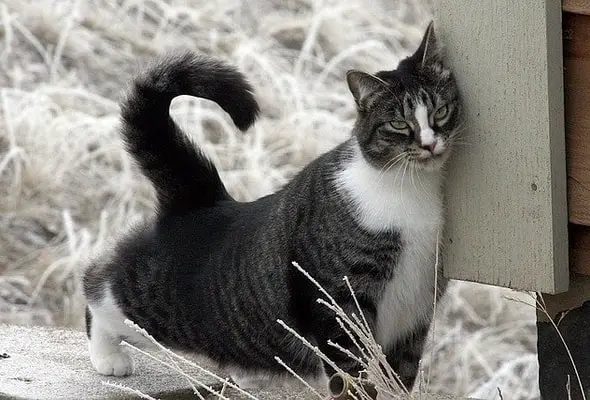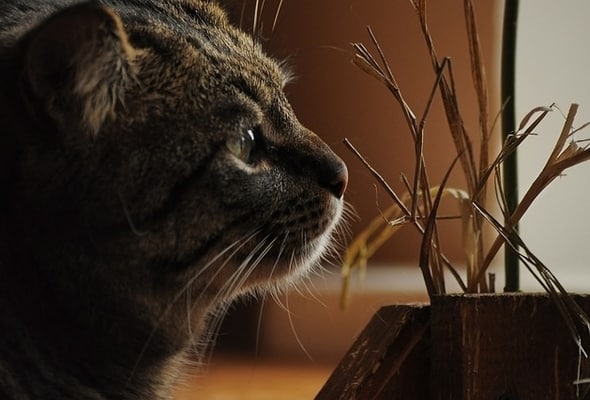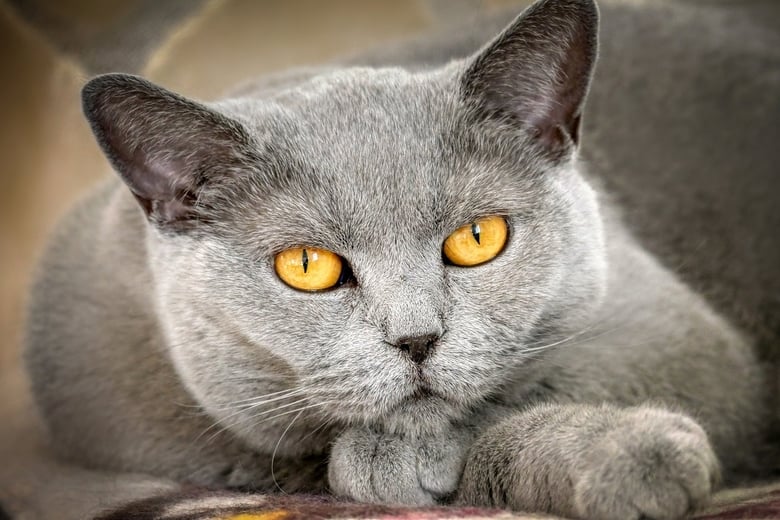“Curiosity killed the cat” is a common saying, but sometimes we are more curious about them than they are about us. Cats each have their own personalities, but there are a lot of quirky traits shared across all of them.
Purring and chattering when happy, zooming around the house late at night, and head bumping us are just a few of these quirks.
Oftentimes we will catch our furry friend rubbing their face along the corner of the wall, or the bed, or even the coffee table; and this prompts the question: why do cats rub their faces on corners?
Why Do Cats Rub Their Faces on Corners?
While your cat rubbing their face on everything may seem like just an admirable habit, it actually has an official term called bunting. Cats of all sizes display this behavior as a way of leaving their scent. They have scent glands all around their face used to leave this scent.
Cats are highly territorial creatures. Because of this, rubbing their heads on corners to leave a scent can be a sign to other cats that there is a fellow feline in the area. Believe it or not, cats actually can tell how long ago a cat has been in the area based on how strong the scent they are picking up is.
These odor messages let cats who live in the same household recognize each other. For outdoor or stray cats, it helps them identify what cats have been near, and whether or not it is safe to stay in the area. It can also lead cats into mating situations.
While leaving a scent is one of the bigger reasons that cats rub their faces on corners of furniture or walls, they’ll also rub up on their humans as a sign of affection. They do this for a multitude of reasons, but mainly to show their affection and trust of you!
They also may want something from you, such as some extra pets or a few treats! Cats are not shy and once they bond with you they will communicate in their own special way. Now that we know the answer behind bunting, let’s delve into a little more about scent glands and this adorable behavior!
Where Else Do Cats Have Scent Glands?
Scent glands contain pheromones, which is the odor message that cats use to communicate. While we’ve already established that cats have these in their chins and ears, they also have them around their mouths, cheeks, and temples.

These are all of the facial scent glands, and they represent friendliness and calmness in and between cats. Another place where a scent gland is present is between their toes. This scent is released when your cat scratches and remains on their post, or your furniture.
Since this scent remains present, your cat will know that they can continue to scratch the object and feel safe. There is also a gland on the anus of a cat. This gland has many purposes, such as communicating the sexual statue and health of another cat.
The gland can also be released into urine, and sometimes feces, to mark territory or send a social statue to other cats. An outdoor male cat with a higher reputation may mark a spot to let the other males know he has been there.
Mother cats have their own scent glands during and after pregnancy. The glands develop around her nipples and release a scent to let her kitties know they are safe and secure. This calms the kittens down and helps them to stay relaxed so they can grow up healthy.
How Long Does a Cat’s Scent Last?
If the scent marking is in the form of urine, the smell can last up to 3 days before a cat will go back and mark it again. This typically only occurs with outdoor male cats, but females can spray too.

If your indoor cats are spraying outside of the box, you may need to take them to a vet and see if they are having any urinary issues, as that can be a symptom. When your cat is releasing pheromones, other cats are using their olfactory system (sense of smell) to pick them up and communicate.
This is one of the primary systems present in cats from birth. Since their sense of smell is so prevalent and strong, the pheromones do not have to be fresh to be detected. It is thought that pheromones can last up to 18 months from when they are first excreted. However, this can vary greatly for a variety of different reasons.
When a cat is scratching, they often scratch the same areas a few times a day, which ends up refreshing the scent and keeping it strong. It is only when the cat stops scratching that the scent begins to fade.
Humans are typically victims of getting cat scents all over them, but through showering and hand washing they fade much faster. Clothes, carpets, and furniture can retain the scents if they are undisturbed and not often washed. So if your cats are indoors often, their scents have most likely been in the same spots since they were first introduced.
Do Cats React to the Smell of Other Cats?
Absolutely! As we have established, cats are extremely territorial and use scent marking and pheromones as their main source of communication. For safety, mating, and mother-kitten bonding, the smell of another cat is very important.
Cats also can bond by rubbing their scent directly on each other. This behavior is called allorubbing. They rub their heads into each other and may even scratch gently at one another. It is mainly used between cats of the same social group, like all of the cats in one certain household.
It is a friendly ritual that is only ever displayed when trust has been established. This isn’t cat exclusive, however, and is why your cat will rub or head bump you!
Because cats are used to smelling the scent and pheromones of their own social group, it can be distressing for them when a new cat’s scent is introduced. This is why when you come home after playing with other cats, your own cat may seem hesitant to come up to you.
It can also be why your older cats are skittish around any new kitten introductions to the family and take awhile for them to connect with each other.
How Can I Get Rid of the Scent of a Cat?
If you are looking to get rid of the smell of cat urine, there are plenty of DIY tips and tricks out there. You will most likely want an enzyme cleaner for the best effect on carpets and furniture, but baking soda, vinegar, or even soap and water can help on less porous surfaces.
Pheromones, however, are less detectable to the human nose. They are often not even noticeable. If you are noticing some funky smells around the house, you should start by creating ventilation by opening all of the windows.
You will also want to vacuum and sweep all of your floors, and wash your clothes and blankets often. This should alleviate most of the problem. If your cat seems to pick up the smells of other cats even though there aren’t other ones present, you’ll want to deep clean the area a few times.
This will lighten the pheromones that have been left there, but may not completely get rid of them. The best remedy for pheromone removal is time, especially if the cat who was leaving them is no longer in the area.
Conclusion
Cats use their olfactory system to communicate with each other and with us. They have scent glands all throughout their body, but mainly on their face. These glands all communicate different emotions to other cats.
Your cat will rub up on corners and even on you to show that the area is theirs and you are a part of their social group. When cats are particularly close with each other, they use their scent glands to communicate love and trust. This is just one of the many behaviors that make cats so lovable.

